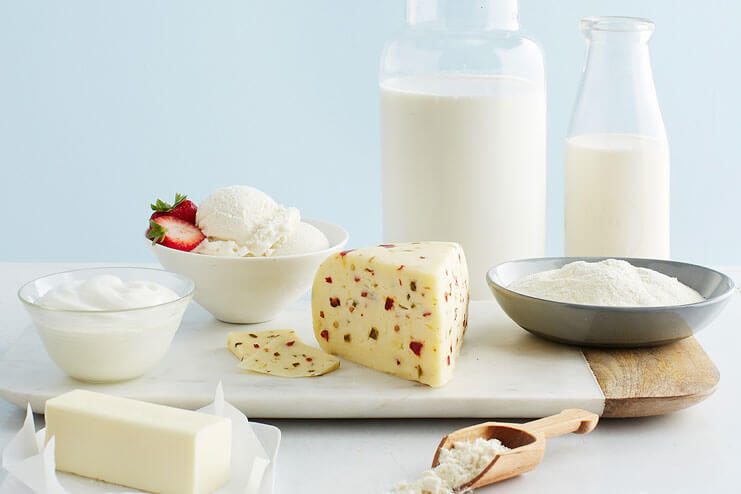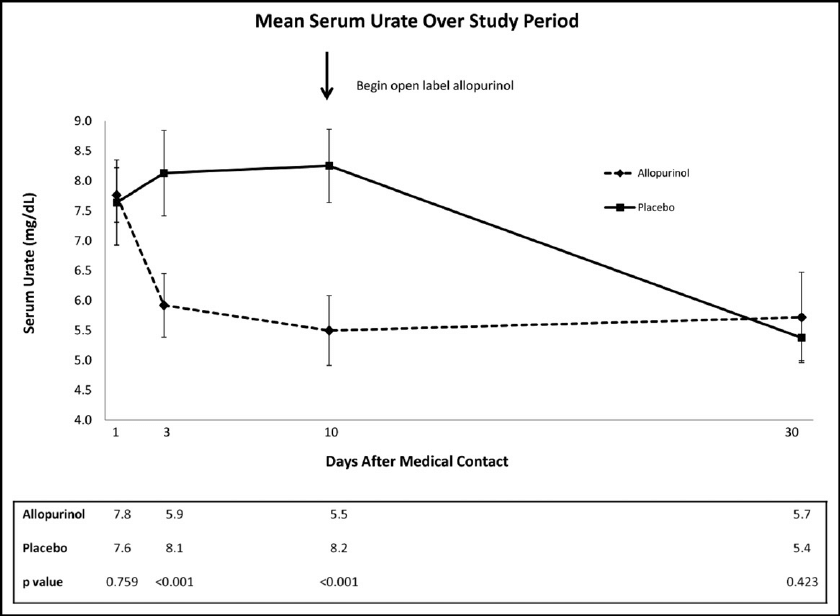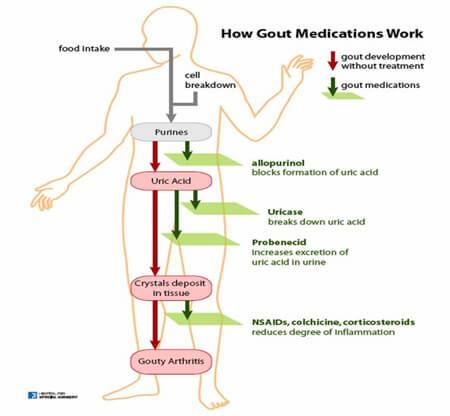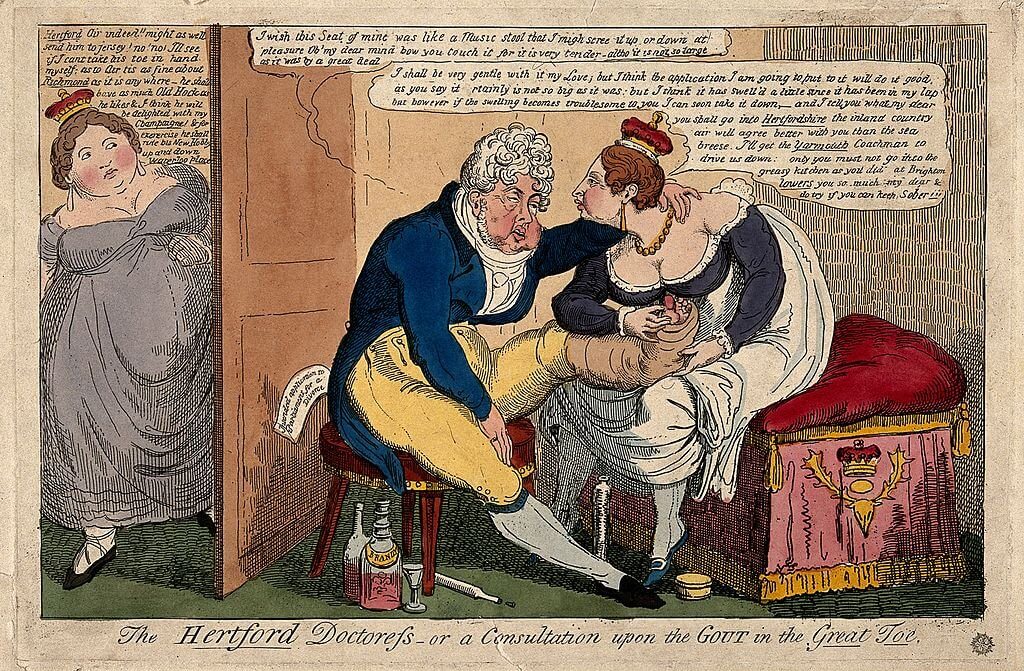Forum Replies Created
-
AuthorPosts
-
 Keith TaylorParticipant
Keith TaylorParticipant
Hi Clement,
Maybe now is a good time to start a new topic dedicated to your gout problem(s). Because I can’t really see what the true problem is.
It seems like your uric acid results are up and down. But we don’t have enough information. Because details are very important when we look at uric acid blood test results.
It would be best to create a list of dates of test results. Also, if you’ve been taking herbal gout medicine, has that been consistent throughout the period?
Another explanation is the 5mg/dL result is just plain wrong. Because not every blood test is accurate. Which is why a good doctor will always take a second test when they see unexpected results.
 Keith TaylorParticipant
Keith TaylorParticipantdo you have any ideas about “vitamin E’s” influence on uric acid
I know you didn’t address that to me @d-q but I’ll butt in any way. (BTW, probably a new topic?)
Uric acid and Vitamin E are both chain-breaking antioxidants. So, the theory says if your body has access to more vitamin E it has less need to produce uric acid. Unfortunately, as far as I can see, it’s an untested theory. Anyway, I’ve put 2 reports in the library for your perusal.
I’m particularly interested in your thoughts about the section near the end of the second report, “Synergistic Inhibition with Vitamin E”. Because, quite frankly, I only understand every other word! 😮
References
1. Ames, Bruce N., et al. “Uric acid provides an antioxidant defense in humans against oxidant-and radical-caused aging and cancer: a hypothesis.” Proceedings of the National Academy of Sciences 78.11 (1981): 6858-6862. Ideas about Uric Acid, Aging, and Cancer PDF.
2. Niki, Etsuo, et al. “Oxidation of lipids, XII. Inhibition of oxidation of soybean phosphatidylcholine and methyl linoleate in aqueous dispersions by uric acid.” Bulletin of the Chemical Society of Japan 59.2 (1986): 471-477. Uric Acid as a Chain-Breaking Antioxidant PDF.August 12, 2017 at 4:26 am in reply to: Allopurinol makes me drowsy. Should I take it at night? #5066 Keith TaylorParticipant
Keith TaylorParticipantI agree with nobody that side effects concerns must be discussed with your doctor. Because the underlying causes of drowsiness can be important.
But, it’s OK to take at night if that suits you. Because allopurinol has a long active period in the body (I won’t bore you with the details unless you ask). So the best thing is to choose a time of day when you are least likely to forget to take your allopurinol. Then you’ll soon be on the way to gout recovery.
By the way, it’s great that you read your meds labels. Because that helps you understand your treatment process better. But don’t get hung up on side effects. Because they only affect a tiny percentage of people who take them.
 Keith TaylorParticipant
Keith TaylorParticipantI’ve never heard of nutritional yeast flakes before. So I’m wondering if it’s this sort of thing: https://www.amazon.co.uk/Engevita-Savoury-Yeast-Condiment-Pack/dp/B00A4C48LQ
If so, I think I’ll stay with my eggs, cheese, and yogurt.

Vitamin B12 Foods
 Keith TaylorParticipant
Keith TaylorParticipantWhy was it important getting mobile as soon as possible when realising that gout pain stems from immune reaction?
Sorry @d_q, it’s taking me longer to answer that than I anticipated. The science (and my discovery of it) is on its way.
Also, I had a great time in the USA, thank you. So now I understand more about some of the different issues faced on each side of the pond. But, I didn’t get any time to research real practical issues. Like why Colcry$ remains popular when Mitigare is available.
 Keith TaylorParticipant
Keith TaylorParticipantLog your flareups into a notebook along with whatever you ate before. Then make yourself wait until the same food or food type shows up many times in your notebook before getting your imagination and logic on the case of any particular food.
Such a joint trouble notebook, with dates and all, might contain information useful to a doctor if your symptoms don’t end up going go away. Or you could use it yourself to see if your flareups are getting less frequent over time.This is an excellent tip for all gout sufferers. Because it can help with diagnosis problems and help with measuring treatment progress. Also, for gout patients who worry about side effects, it’s a great tool for isolating real problems.
 Keith TaylorParticipant
Keith TaylorParticipantI’ve collected various threads here that relate to gout with kidney disease. Because, as I said earlier, this is usually too complicated for an online forum. So, generally, I want to refer kidney-related questions back to the doctor.
Anyway, here is a 12 point guide why this is complicated. Also, individual gout patients with kidney disease will have their own added personal complications. So, feel free to discuss general aspects of gout with kidney disease. But please discuss personal medical issues with your doctor.
I’ve changed the wording of this 12-point list to try to make it more readable. It’s from chapter 30 of Rheumatology and The Kidney (Courtney, Philip, and Michael Doherty. “Management of gout in the patient with renal disease.” Rheumatology and the Kidney (2012): 415.):
- Gout is increasing in prevalence. In part due to the increasing frequency of end-stage kidney disease.
- Kidney disease can cause uric acid to rise to the point where crystals form.
- Other risk factors for gout include genetic predisposition, age, male gender, obesity, diet/lifestyle, and osteoarthritis.
- Kidney disease often links with unusual gout and difficulties in management. Usual gout drugs might be toxic or otherwise inappropriate.
- Education, information access, and lifestyle advice are important for gout patients with kidney disease.
- For kidney disease patients, the single-joint gout attack is best managed by local ice-packs. Together with joint fluid draw and injection of intra-articular corticosteroid. Also, joint fluid analysis allows confirmation of the diagnosis.
- Multi-joint gout attacks in kidney patients can be treated with a short course of systemic corticosteroids.
- Lifestyle advice and treatment should reduce uric acid well below 6 mg/dl (360 µmol/l).
- Allopurinol can be used at lower doses in patients with kidney disease. But the therapeutic target may not always be reached.
- Febuxostat (Uloric) is a new alternative to consider for patients with kidney disease who cannot take allopurinol.
- NSAIDs, colchicine, sulphinpyrazone, and probenecid are not suitable for patients with severe kidney disease. However, benzbromarone can be effective in patients with mild-moderate kidney disease.
- Biological therapies that block IL-1β have been shown to be very effective in the treatment of acute attacks and may reduce the frequency of acute gout.
 Keith TaylorParticipant
Keith TaylorParticipantYes, John.
Start Allopurinol Quickly, But Carefully.
Quickly – the sooner you start, the sooner you gain complete gout recovery.
Carefully – note that the people in that study took indomethacin to support colchicine. Because colchicine limits new inflammation. But does nothing to reduce existing inflammation. So, ask your doctor/pharmacist about Indocin. Or other anti-inflammatory such as ibuprofen, naproxen or diclofenac. Also, you could ask about taking acetaminophen at the same time to block any residual pain (if necessary). There are lots of possible colchicine combinations, as you can see from those discussions.

How much time will you waste by delaying start of allopurinol therapy?
 Keith TaylorParticipant
Keith TaylorParticipantHi Eric,
Am now taking just allopurinol and doing fine. Uric acid is controlled.
If that’s true, you don’t need colchicine. But is your uric acid below 6 mg/dL (better below 5)? Because 6 is the maximum safe level, and 5 gives a good safety margin.
Finally, if you’ve only just got down to that level, you might still get occasional flares until more old uric acid crystals dissolve. But if Indocin is working OK for you, there’s no need for colchicine.
 Keith TaylorParticipant
Keith TaylorParticipant@d_q I just found myself Googling “memory problems from trauma or dementia” because I feel I should know what you are talking about. But I don’t.
Why febuxostat instead of allopurinol?
The colchicine limit of 6mg over 3 days is peculiar to Britain. I can see the point of that. Because creating rules means you can try to protect the safety of the general population. But, as far as I know, there is no specific medical evidence to support it. As nobody says, dosing guidelines for colchicine vary considerably. America did some real research with Colcry$. But ultimately that became more about wealth transfer to the rich rather than safe medical advice. That is, “Here’s a tried and tested safe dose for colchicine that works. Now give me $194.93 to reduce your gout pain by half.”
In essence, you cannot get a universal medical consensus on colchicine dose. But that’s OK with me. Because I believe colchicine dose should be down to the individual (within the bounds of safety).
More importantly, your rheumy is a prime example of doctors who have no clue about pain control. Talk to a senior nurse. They have better pain control experience and lower morbidity rates.
I made that last sentence up. Because it’s the kind of nonsense that fits well with statements like “So if the colchicine doesn’t make an acute attack better after 3 days of 2mg then stop the Colchicine and then I can start NSAIDs.”
Reading this back, @d_q, I realize I’m being less than helpful. But, you’ll be aware that I like to start a problem by understanding its purpose. And, I’m really not sure what we are trying to achieve here.
3 days of gout pain when you can stop it in 3 hours!?! It’s no wonder people turn to ACV and baking powder.
 Keith TaylorParticipant
Keith TaylorParticipantThat’s great Rebecca. But, personally, I wouldn’t worry too much about getting another attack. Because, if it happens when your uric acid levels are below 0.30 mmol/L, it is a happy sign that your gout recovery is going well.
I’m not saying these attacks are something to look forward to. But, they are a good sign that old uric acid crystals are leaving your body for good. So, attacks become less frequent and less intense.
I remember this well from my own experience. Because it made me happy to know I was recovering. Then one day I realized I couldn’t remember the last time I had an attack.
Gout Freedom is good! 😀
 Keith TaylorParticipant
Keith TaylorParticipantOIC @d_q
You’re the only person on the planet who takes any notice of my personal gout treatment program. And I include myself in that.
My reality is that I read stuff. Then, I talk to medical people about it if I get the chance. Next, I experiment within what I believe are safe boundaries to get a plan that works for me. So, with uric acid control, that’s easy. But with pain control, it’s more complicated. Especially with gout pain control.
First and foremost I had an epiphany when I realized gout pain stems from an immune reaction. Prior to that, I had the more typical view that sharp uric acid crystals were forming. So, I understood the importance of getting mobile as soon as possible. Fortunately, prescription strength ibuprofen (Aleve) kept me going almost every time. But if it didn’t I supplemented with paracetamol (Tylenol).
BTW, a quick aside, where are you buying your pain drugs? Diclofenac and naproxen are both widely available next to ibuprofen and paracetamol at your local Co-Op. I haven’t checked Aldi yet.
When I finally took some of my own advice and started allopurinol, my doctor brought colchicine into the mix as a preventative. Now, by this time, I understood how colchicine poisons the immune system to limit inflammation starting or spreading. So, I started preventative colchicine for two weeks every allopurinol dose change. Then as required.
So, the preventative part is not really part of this topic. But, I’ll explain it anyway because I think it’s where the 12 hours comes from. The best time to take preventative colchicine is at bedtime. But, if you wake up with slight gout symptoms, it’s usually the first sign of an attack. So, you prevent an acute attack with a morning colchicine. Also, consider a first NSAID at the same time. I used to wait a couple of hours before taking the NSAID, then realized I should be best taking them together. But remember I have absolutely no stomach effects, so you might need to carefully experiment.
Now, you might have a lazy 12-hour kip, d_q. But I’m happier with 5 to 8 hours. There is no fixed rule about hours. The second dose is backing up the preventative dose that might not have quite worked. It might not be necessary, but I’m not one to ask for an acute attack.
Returning to your acute gout attack plan. I have to say my advice is quite speculative. Because, since starting allopurinol, I have never had a serious acute attack. Though I have definitely experienced the onset of an attack and stopped it within 2 hours.
So, d_q, going back to your original “let’s say someone gets an acute flare today; what would be your dosing to hit hard?” My speculative answer was my “Dear Someone” letter above.
Finally, returning to the gap between colchicine doses.
Firstly, I’d suggest if you are worried, you switch to a different poison. Because there is always a risk of stomach problems with colchicine. Also, there are infection risks, so you have to be aware of germs from people around you.
If you do go down the colchicine route, I’m sure any doctor would back me up if I say you have to adjust your dose according to your personal experience. That means carefully recording your symptoms and reactions. An hour between doses should be OK. But everyone is different for all sorts of reasons.
I won’t bore you with all those reasons now. Instead, let’s look at the practical approach. The 2-hour cycle that I suggested above definitely works. I can’t think why you would want to take a second colchicine after only one hour, but it should not be a problem if the first one didn’t have you shitting yourself.
Thanks for helping me clarify this in my brain. Now, I need to review relevant pages to make sure all these points are covered properly. But first, I must worry about the grammatical challenges arising from my thoughts: “I can’t do this without d_q and nobody” 🙂
 Keith TaylorParticipant
Keith TaylorParticipantHa Ha urankjj, “nobody cares”! 😀
I’ve been expecting something like that ever since our fine friend chose his unusual username. But, it still caught me by surprise. Anyway, please add me to your list of people who care. I didn’t realize you were waiting for a response. But, if you want to attract my attention, please use a mention. That is when you type an @ followed by my username, keith. There must be no space between @ and username. Just please don’t overuse it. Because it generates an email to me, and I’m already struggling to control my inbox!
Anyway, I share your disappointment with your uric acid test result. But, I wonder if it’s malic acid related. Because I don’t think herbal gout remedies are strong enough to allow you to eat badly.
For example, gout patients on allopurinol can eat what they like. Because allopurinol removes most of the uric acid risk from food (simplistic view). But, if they continue with unhealthy eating, they’ll end up with stroke, heart disease, etc.
For gout herbalists, I think you have to also eat a gout-friendly diet, as herbal medicines are less powerful. But 80% plant based doesn’t sound too healthy to me. Because that means 20% of your food is animal based. Or, even worse, chemical-based. Now, I might be misunderstanding the detail here. So, urankjj, how about starting another topic where we can discuss if your diet is gout-friendly?
After that, if you have a good gout foundation diet, maybe we could look at combining malic acid with other uric acid lowering herbal medicine. Because combination treatments have proved to be effective in the pharma world. Eg, gout patients commonly support allopurinol with probenecid as they work on different aspects of excess uric acid.
 Keith TaylorParticipant
Keith TaylorParticipant@d_q, I’ve been thinking during my coffee break. Because, when I see things more complicated than a simple question and answer, I automatically move to 7-Step Progress mode. Then, I go back to the beginning and recheck what we are trying to achieve.
So, I started a quick review, and the lack of purpose is hitting me straight between the eyes. I think that is my fault, with hindsight. Because I should have asked for clarification as my first response.
To explain, I get the feeling you are looking for a one-size-fits all Three Stage Gout Pain Prevention Plan. But, that is not how I work. Because all aspects of gout management need to apply general principles to individual needs. Therefore, I want to take a common plan. For example, the Colchicine-NSAIDs-Paracetamol plan you started with. Then highlight for individual gout patients which points they need to make decisions on.
In that way, I can present an annotated plan that highlights personal choice. Together with guidance where they might make choices, discuss with their doctor, or seek extra info.
But, if I’ve read this wrong, maybe you are seeking your own personal acute gout pain plan?
So, d_q, can we restart by clarifying what we are hoping to achieve here? Then, I can summarize progress so far in the right context.
 Keith TaylorParticipant
Keith TaylorParticipant@d_q
KQ1. Where does the 1-hour colchicine dose interval come from? Is it the Colcry$ picture I used to illustrate an earlier reply? If so, I hope you realize they are robbing bastards, and not to be trusted? On the other hand, I’ll recheck their research as part of my aforementioned review of this thread. Because that should indicate if it’s a medical optimal dosing regime. Or, as I strongly suspect, an accountant’s optimal profit dose. Interestingly, I thought I’d invented spelling Colcry$ with a $. But my spell checker (the exceptionally good Grammarly) recognizes it just fine. 🙂
KQ2. Where does the 12-hour colchicine dose interval come from? You’ve mentioned it 3 times now without explaining where it comes from.
KQ3. Why do I only get 2 choices of colchicine dose interval?
 Keith TaylorParticipant
Keith TaylorParticipantAt 6.5, you are just on the cusp of uric acid control. Because I believe what is happening is that you are moving constantly around the point where urate crystals form (around 6.8). So as soon as the crystals start to dissolve, the uric acid rises again, and new ones might form. For more information, use the search box near the top of each page to Google “Gout Hell”.
Ask your doctor to approve 300mg, to get your level down more. Please don’t give up on the allopurinol, as it is your best chance of controlling the gout.
You will still get some attacks for a few months, but they will reduce in intensity and frequency. Colchicine should help. How much do you take?
 Keith TaylorParticipant
Keith TaylorParticipantThanks for the extra info, Bob.
I look forward to seeing more of your uric acid blood test results. Because that’s the heart of controlling gout.
But, controlling attacks is something entirely different.
I realize ER can be difficult, and shouldn’t be necessary. So, I have always relied on Advil. But, when it hasn’t given me enough relief to stay active, I backed it up with Tylenol. Initially, I found that combo in a hospital. But, other doctors have backed it up. Also, friends but some say take them together and others say alternate every 2 hours or so. I think the best thing is to phone a doctor for advice or check your local pharmacist. Please don’t just take my word for it. Because medicine has to be professionally considered and I have no qualifications.
-
AuthorPosts


